
The mind is a subtle material covering of the self or soul. The mind’s activities include thinking, feeling and willing. It is also a vast collection of all our sensual input from this lifetime and from countless other lifetimes in the material world. What we recollect – our memories – are only the tip of the mind-stuff iceberg. The rest is stored in the unconscious part of the mind and still has an influence on our consciousness. Occasionally we may have a memory, dream or strong experience of having been somewhere or done something before. This may be a memory of a past life experience, what is sometimes referred to as Déjà vu (literally “already seen.”)
Just as the body is a machine used by the living self or soul, so also is the mind a machine used by the self. The mind may be compared to a computer upon which is uploaded and downloaded the recordings of all our sensuous experiences. Though the mind is much more subtle than the gross material body it is still a material covering. Because of the subtlety of the mind, it is more difficult to appreciate the difference between the spiritual self and the mind. There are a number of ways, however, by which we can gain this understanding through analysing the mind’s activities, such as watching the mind – mindfulness – and the Silent Witness techniques etc. Also by reflecting on the process by which we control the mind, we can understand that the mind is a subtle tool used by the far more subtle spirit soul within – you, the person who is using the body and mind.
The mind is an instrument or tool I use to achieve my goals. We say “I changed my mind” or “I can achieve anything if I put my mind to it.” Studying is a good example. Perhaps I have something I need to learn for school or work. Maybe it isn’t that interesting and my mind tends to wander, but I force my mind to focus on the job at hand. Then maybe ten or fifteen minutes later I realize that my mind has been wandering, perhaps I’ve been day-dreaming – I’ve been thinking about the sunny weather outside, about the beach, what I will have for lunch, wondering what my friends are up to etc. etc.

Eventually my reverie is broken, and I realize that I haven’t been paying any attention to what I’ve been supposed to be learning, that my mind has been wandering – I’ve been spacing out. I then have to grab hold of my mind and drag it back and force it to focus on the task at hand. Who is controlling the mind, using the mind, forcing the mind to focus on the work to be done – it is I, the spirit soul, the self beyond the body and mind.
And if I am unable to control my mind, I may find it very difficult to achieve my goals, to perform at school or work. And according to the degree of this inability to control my mind, I may be experiencing anxiety, or various other mental problems such as unwanted thoughts or memories, phobias – irrational fears. Or in extreme cases, my mind may descend into psychosis, where there is a complete loss of contact with the external reality, where I totally believe whatever weird and wonderful ideas pop into my head. In such a case, I have lost control of my mind, and my mind with all its confusion and illusion, has taken over, and I have descended into madness. Krishna speaks of the danger of an uncontrolled mind in the Bhagavad-gita:
For one who has conquered the mind, the mind is the best of friends but for one who has failed to do so his very mind will be the greatest enemy.
[Bhagavad-gita 6:6]
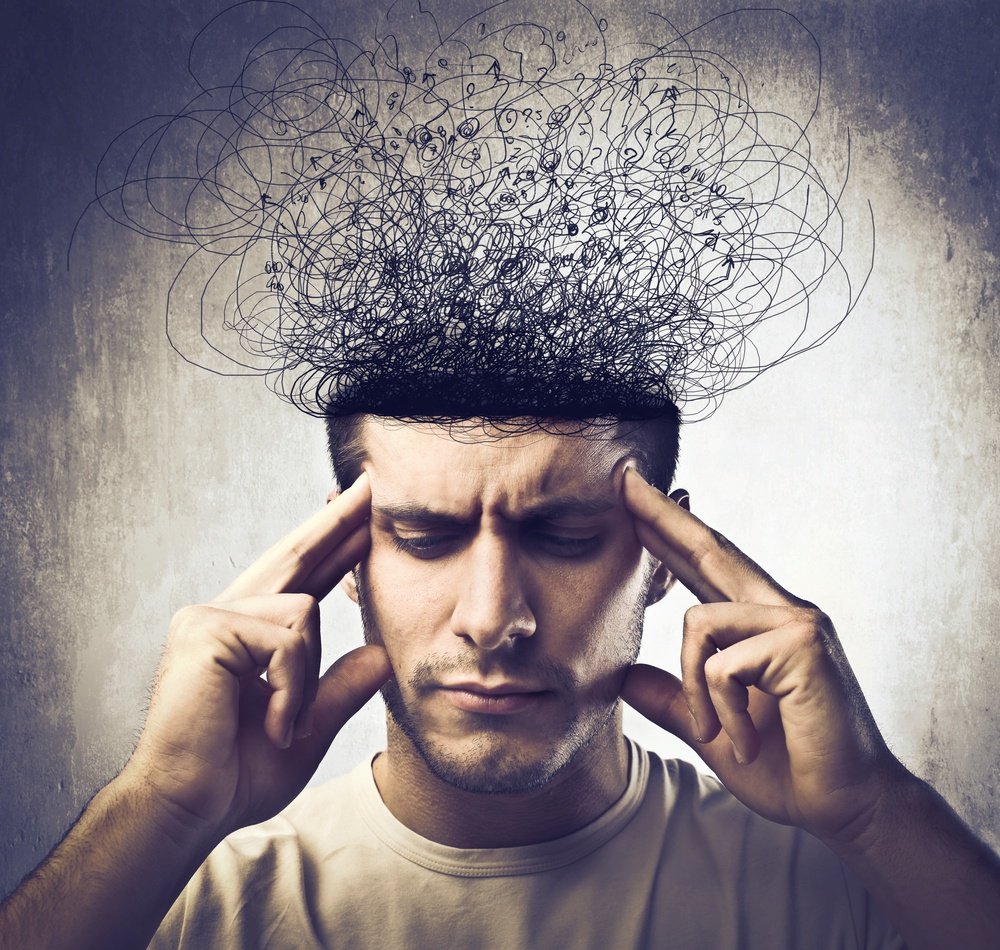
In the Bhagavad-gita, the Supreme Person, Krishna, explains that the subtle body, which comprises mind, intelligence and false ego, is His inferior energy – it is material, not spiritual. He then goes on to say that above these material energies is His superior energy, the living entities or spirit souls:
Earth, water, fire, air, ether, mind, intelligence and false ego – altogether these eight comprise My separated material energies. Besides this inferior nature, O mighty-armed Arjuna, there is a superior energy of Mine, which are all living entities who are struggling with material nature and are sustaining the universe.
[Bhagavad-gita 7:4-5]
As long as one’s happiness is dependent on material things or material outcomes, there will always be some form of anxiety. We will be hankering after what we haven’t got, fearing we’ll lose what we have, or lamenting for what we had and lost. These are the three phases of material attachment and they can gnaw away at a person’s peace of mind. A person who is tasting the nectar of inner spiritual happiness is not dependent upon anything material for their happiness – they are said to be atmarama, or self-satisfied.
In the Bhagavad-gita, Arjuna is asking Krishna to help him overcome a very complex set of problems which actually equate to the problems beset by all souls who are trapped in the material world. At one point Arjuna expresses the difficulty of controlling the mind:
For the mind is restless, turbulent, obstinate and very strong, O Krishna, and to subdue it is, it seems to me, more difficult than controlling the wind.
[Bhagavad-gita 6:33]
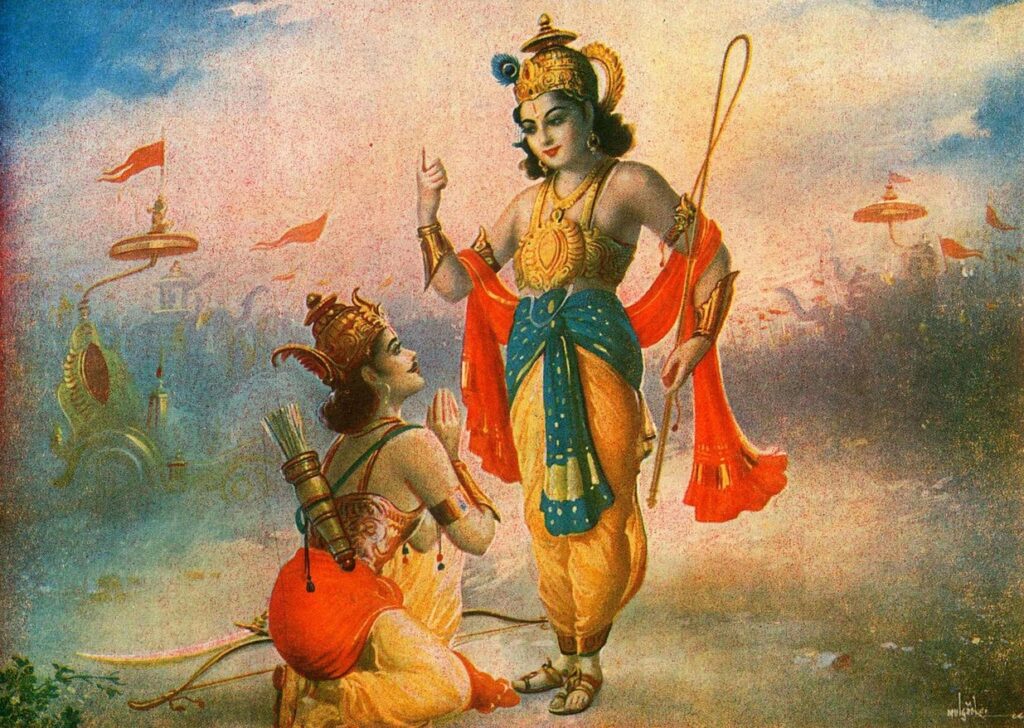
Srila Bhaktivedanta Swami was the first self-realized devotee and scholar to translate the Bhagavad-gita into English and make its great wisdom available all over the world. In his purport to this verse, he explains the correct relationship between the mind and the intelligence which leads to mental equilibrium and peacefulness. He explains that this can only be fully and permanently achieved in this age through the mantra meditation process. Srila Bhaktivedanta Swami states:
The mind is so strong and obstinate that it sometimes overcomes the intelligence, although mind is supposed to be subservient to the intelligence. For a man in the practical world who has to fight so many opposing elements, it is certainly very difficult to control the mind. Artificially, one may establish a mental equilibrium toward both friend and enemy, but ultimately no worldly man can do so, for this is more difficult than controlling the raging wind. In the Vedic literatures it is said:
The individual is the passenger in the car of the material body, and intelligence is the driver. Mind is the driving instrument, and the senses are the horses. The self is thus the enjoyer or sufferer in the association of the mind and senses. So it is understood by great thinkers.
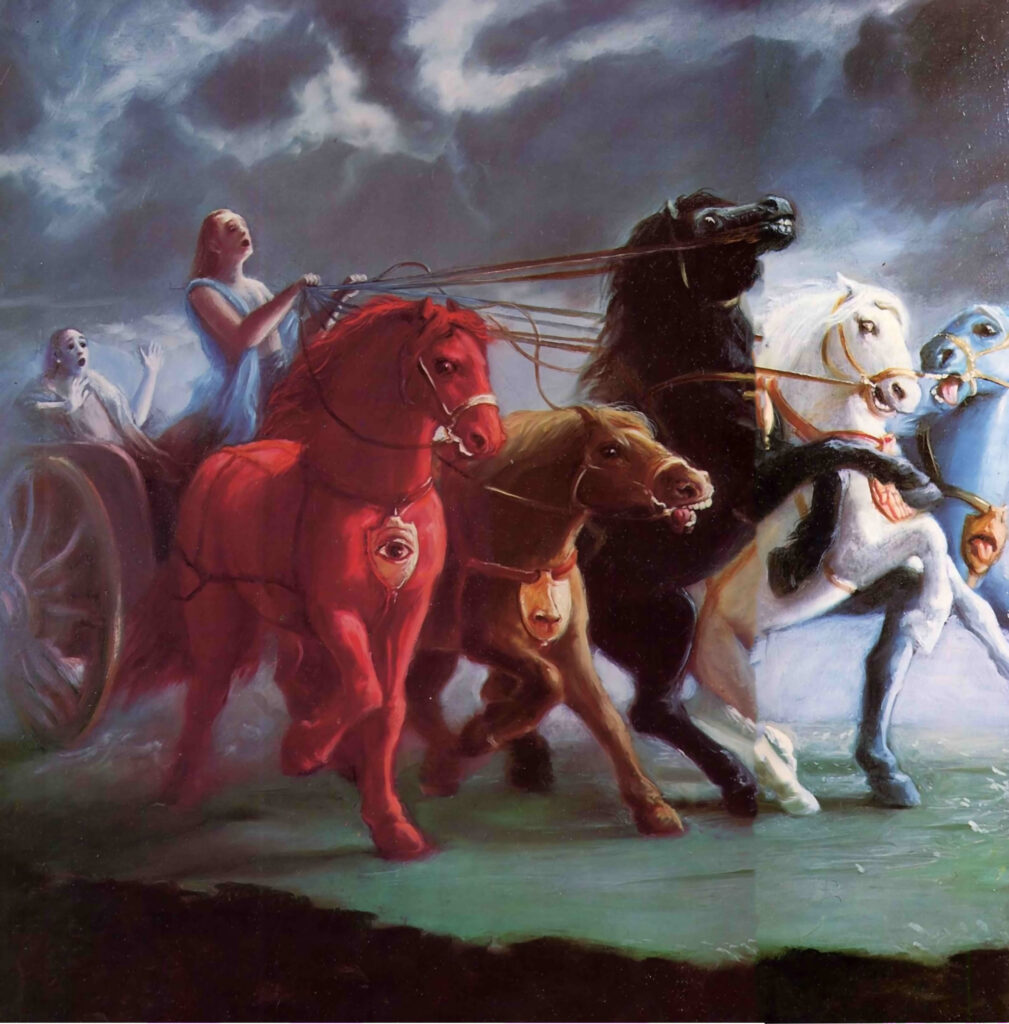
Intelligence is supposed to direct the mind, but the mind is so strong and obstinate that it often overcomes even one’s own intelligence. Such a strong mind is supposed to be controlled by the practice of yoga, but such practice is never practical for a worldly person like Arjuna. And what can we say of modern man? The simile used here is appropriate: one cannot capture the blowing wind. And it is even more difficult to capture the turbulent mind. The easiest way to control the mind, as suggested by Lord Chaitanya, is chanting “Hare Krishna,” the great mantra for deliverance, in all humility. …
Srila Bhaktivedanta Swami explains intelligence in a purport in the tenth chapter of Bhagavad-gita:
Intelligence refers to the power of analyzing things in proper perspective, and knowledge refers to understanding what is spirit and what is matter.
[From purport Bhagavad-gita 10:4-5]
The Mind as a Computer – Mad Dog Dugan
The mind is like a computer, and the thoughts and images it contains directly correspond to what we feed into it. We are our own programmers. Just like with a computer, what’s typed in from the keyboard, the photos, movies and music you upload, the material you download from the web, the files you create, show what you are into. If you wanted to know what makes someone tick, you could analyse their computer, look at their files, their stored images, read their emails, look at the addresses of their friends and associates, look at their “favourites,” read their download history, and you’d end up with a pretty good picture of what that person is like. And in fact one of the first things the police do when they are trying to mount a case against a suspected felon is to seize his computer.
For example, let’s take Mad Dog Dugan, a member of the Heathen Derelicts bikie gang. Mad Dog likes to hang out down in “Faulty-Dude Valley” [Brisbane’s Fortitude Valley] where there’s lots of night-clubs, strip joints, drugs, prostitution and all-night bars. He spends a lot of time there making sure his drug dealers are well supplied, and terrorizing the dealers from rival bikie gangs – staking out his turf. If we examine Mad Dog’s computer, we’ll get a good idea of his activities and his consciousness. If we look at his photos and downloaded images we might find lots of pictures of Harleys, various choppers, designs for scary and crude tattoos, big mean tattooed hairy guys and naked bikie chicks. In amongst all of this we might find a photo of his poor old mum.

If we look at his addresses, we might find the phone numbers of “Wild Pig” Wilson, Vernon “the Punisher” Peterson, “Toe-cutter” Thompson, Eddie “the Executor” Edwards, “The Beast,” “Shottie” Simpson, “Hog Guts” Hudson, Irwin “the Undertaker” Atkins, “Easy Rider” Schneider, etc. Association is a large factor in determining our consciousness. No man is an island – we all influence and are influenced by those we choose to hang out with.
If we look at Mad Dog’s download history, we might find various sites he’s accessed, like Brisbane’s Biker World; Big Boob Biker Chicks; Morgan and Wacker Motorcycles; More Big Boob Biker Chicks; Harley Davidson Australia; Setting Up Your Own Methamphetamine Lab in Five Easy Steps; Big Boob Biker Chicks Summer Edition; How to Find the Gypsy Jokers Clubhouse; Make Your Own Bomb; Best of Big Boob Biker Chicks; Make your Own Sawn-off Shotgun; Cutting Fingers, Pulling Teeth – How to Make a Body Untraceable; Big Boob Biker Chicks For Connoisseurs; Good Spots to Dispose of Bodies in Brisbane; Chopperworks Custom Built Harleys; How to Set Up a Hydroponics System; Growing Your Own Dope; Eliminating the Competition; The Best of Big Boob Biker Chicks; Do the Crime But Not the Time – Legal Advice For Dummies; Big Boob Biker Chicks – the Ultimate Collection etc. etc.
The point is that it is no accident or coincidence as to what our consciousness – our state of mind – will be. It is directly a result of what we see, hear, taste, smell and touch, our habits, our association, what we read, what we watch on T.V., the movies and music we listen to, what we regularly do, our environment – where we hang out – all of these things affect our consciousness. If we hang out in Faulty Dude Valley with Mad Dog, chances are that sooner or later we will ride a chopper, sell methamphetamines, dispose of bodies, blow up rival bikers, and ogle Big Boob Bikie Chicks – that will become my world.
Creatures of Habit
People are creatures of habit. And what we do habitually creates an ever-deepening groove which our mind automatically follows. We get “in a rut.” In the days of dirt roads and horses and carts, a rut was a track or pair of tracks scored into a dirt road, caused by constant traffic. When cart wheels were caught in the ruts on an ancient road, you had to follow that course – it was hard to travel on that road otherwise – you had little choice.

What we do regularly creates habitual desires – a “drug habit,” a “gambling habit,” a “habitual criminal” for example. And these desires cause us to act in a particular way – our actions follow our desires and our desires follow our actions, and in this way we get caught in the vicious cycle called material conditioning. As the saying goes, “Old habits die hard.” It may take great determination and perseverance to change our habits and our resultant consciousness.
The Mind is Like a Cocoon
The mind is like a cocoon. Spiders and silk-worms both produce a fine silky web. The web of a spider is a deadly trap created to capture victims so that they can be devoured. Often, when a fly or other insect is caught, the spider wraps them in more and more web, making an envelope from which they cannot escape. It’s like being on death row for the insect as they wait in terror to be eaten. Material consciousness envelops the living entity just like a spider’s web. We remain trapped, and the outcome is always death – lifetime after lifetime.

The cocoon of a silk-worm is quite similar in nature to a spider’s web. However, it is a protective shelter of silk, spun so that the silk-worms can go through their pupa stage, before becoming a moth, protected from predators. So the spider’s web and the silkworm’s cocoon are both environments for living beings, one to protect and the other to entrap. Similarly, the spirit soul is enveloped by his mind, his state of consciousness, and the nature of the mind determines whether we are protected or entrapped by the inner world that we create.

The chanting of sacred mantras creates a protective cocoon – the spiritual sounds spiritualize the mind. These mantras have all of God’s purity and potency – they have the power to gradually transport us into the spiritual world, called Vaikuntha – that place where there is no anxiety. The Bhagavad-gita explains that as our consciousness is gradually spiritualized, we are able to steady the intelligence and control the mind, leading to peace and great internal happiness:
For one who is so situated in the Divine consciousness, the threefold miseries of material existence exist no longer; in such a happy state, one’s intelligence soon becomes steady. One who is not in transcendental consciousness can have neither a controlled mind nor steady intelligence, without which there is no possibility of peace. And how can there be any happiness without peace?
[Bhagavad-gita 2:65-66]
The end result or goal of the yoga system is known as samadhi – constant absorption of the mind in the thought of the Supreme – and Krishna explains that one who has attained this state is never lacking in knowledge, happiness or love. He is fully satisfied and not affected by life’s miseries:
In that joyous state, one is situated in boundless transcendental happiness and enjoys himself through transcendental senses. Established thus, one never departs from the truth and upon gaining this he thinks there is no greater gain. Being situated in such a position, one is never shaken, even in the midst of greatest difficulty. This indeed is actual freedom from all miseries arising from material contact.
[Bhagavad-gita 6:22-23]
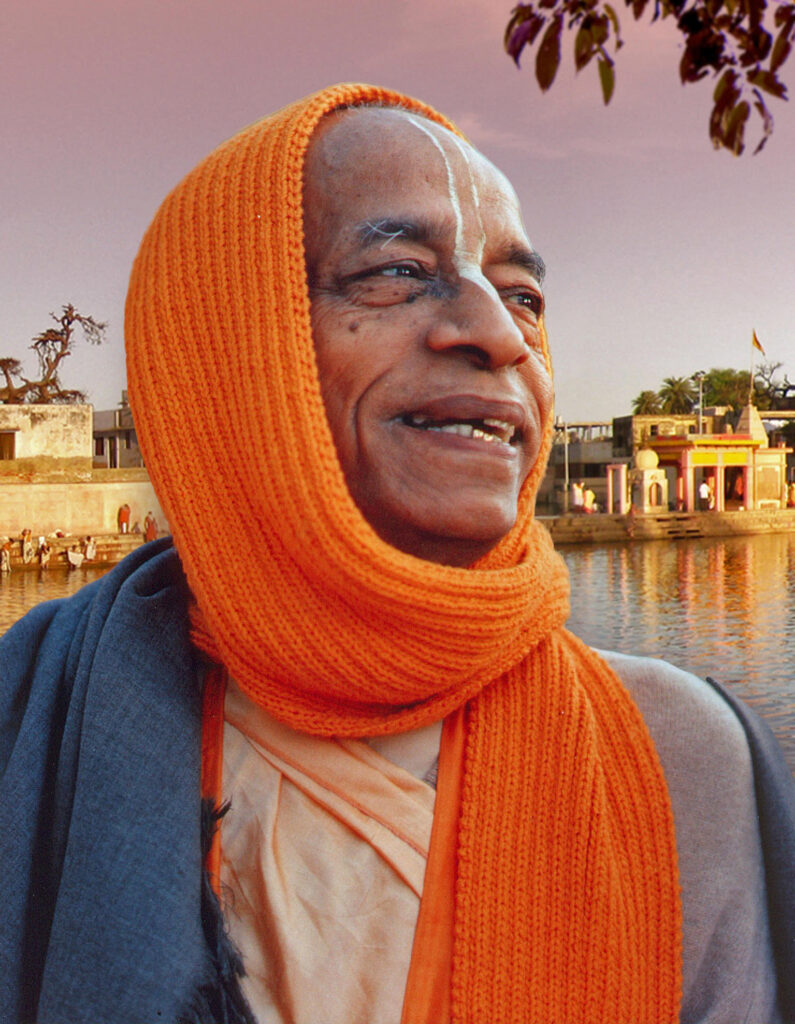
Srila Bhaktivinoda Thakur describes very beautifully the happiness of one who has love for Krishna:
I have become supremely joyful by surrendering myself at Your holy feet. Unhappiness has gone away, and there are no more anxieties. I see joy in all directions.
Your two lotus feet are reservoirs of immortal nectar where one may live free from sorrow and fear. I have found peace there now and have given up the fear of worldly existence.
I shall render service in Your household and not endeavour to enjoy the fruits of that service, but rather I shall strive for whatever pleases You, fully devoted to Your lotus feet.
Troubles encountered in Your service shall be the cause of great happiness, for in Your devotional service joy and sorrow are equally great riches. Both destroy the misery of ignorance.
I have completely forgotten all past history by feeling great joy in my mind. I am most certainly Yours, and You are indeed mine. What need is there of any other treasure?
Bhaktivinoda, diving into the ocean of bliss, devotes all his efforts for Your service and dwells in Your house according to Your wishes.
[Bhaktivinoda Thakur: Self Surrender]
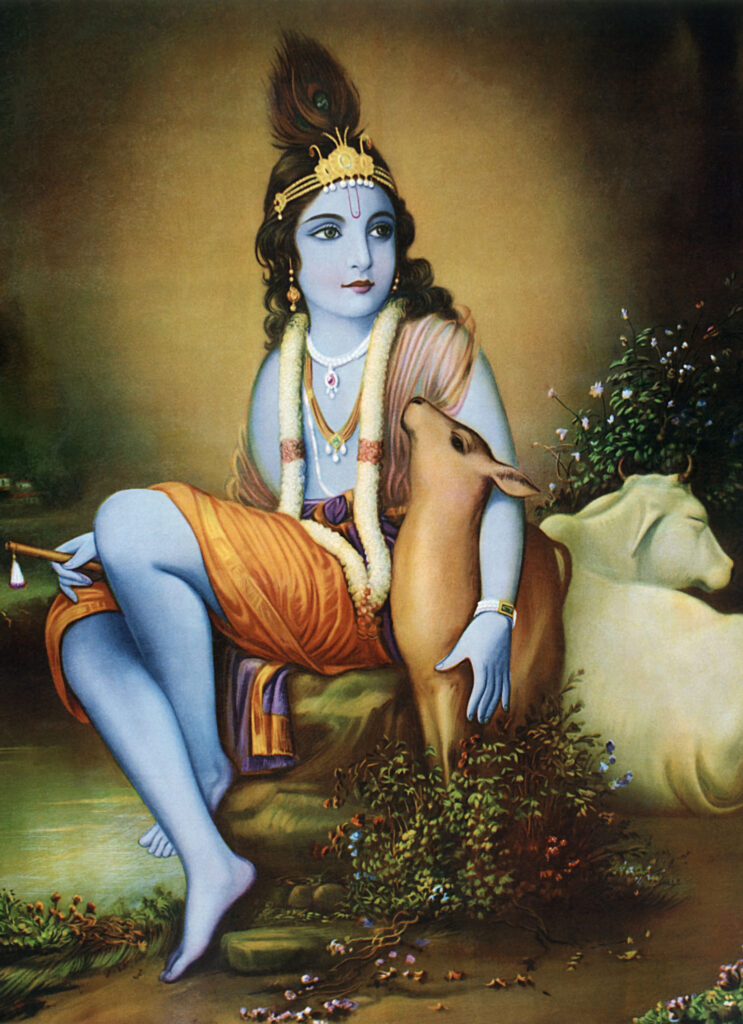


Leave A Reply